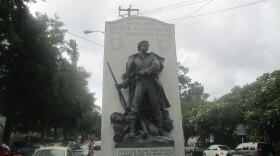On November 10, 1898, an angry white mob led by prominent Wilmingtonians like Alfred Moore Waddell, Hugh MacRae, George Rountree, and J. Allen Taylor, murdered anywhere from a dozen to 300 people. These white supremacists forcefully removed black politicians from power, and hundreds of black business owners and residents fled in the aftermath. This feature includes video interviews with local leaders.
Scroll down for video interviews
This page documents the only known coup d’état in American history. A 2008 memorial on North 3rd Street in downtown Wilmington commemorates the coup, yet the significance of the event has not reached Americans’ collective consciousness. Through the resources collected here, WHQR hopes to advance the conversation about this seminal American tragedy. Below you will find interviews conducted with Wilmingtonians on the topic of the 1898 and what it means in the 21st century, as well as an interactive map which chronicles the historical events surrounding the coup.
Welcome to WHQR’s multi-media tour of America’s only successful coup d’état.
“Understanding 1898”: WHQR’s Interactive Map
Map produced by Annabelle Crowe.
This map was produced with the help of research from LeRae Umfleet’s A Day of Blood: The 1898 Race Riot and Cape Fear Rising, a novel by Philip Gerard. Both are excellent resources for further exploration. Thanks to the Cape Fear Museum and UNC Libraries for the use of historical images.
In 1898, Wilmington’s population was majority black, and the city was a post-Reconstruction mecca for African American advancement. Three of ten members of the Board of Alderman were black, and African Americans accounted for 30% of the area’s skilled craftsmen. Alexander and Frank Manly owned the only black daily newspaper in America.
The massacre that occurred that year took place against the backdrop of an election. Post-Civil War, North Carolina politics were dominated by Republicans, the party of Lincoln, and Democrats, the party of Southern landowners. Populists represented a powerful third party. In the 1890s, Republicans and Populists joined forces: a political merger known as Fusion. Populists attracted farmers and white workers, while Republicans commanded the African American vote. Fusionists passed election laws that enfranchised African Americans, and the Fusion government in Wilmington included three black aldermen.
In 1896, the Fusion coalition once again swept the state election. Democrats knew the only way to defeat this bloc of black and white voters was to stir up white supremacist fervor. The Democratic campaign of 1898 relied on “men who could write, men who could speak, and men who could ride” (Umfleet 38)—a combination of fiery speeches, vicious journalism, and white terrorist groups intimidating black voters.
The campaign was effective across the state. But unfortunately for Wilmington Democrats who wanted to replace Fusion politicians, municipal elections were not due until 1899. It was against this backdrop that a small group of wealthy white leaders decided to overthrow their city government.
-
-
-
-
-
-
-
-
-
 CoastLine: "The time for talking is over." Great-great-grandchildren of The Daily Record's Alex Manly on white consumption of Black pain and why it's time for white people to do their own work towards racial reconciliation
CoastLine: "The time for talking is over." Great-great-grandchildren of The Daily Record's Alex Manly on white consumption of Black pain and why it's time for white people to do their own work towards racial reconciliation -
-
-
-
-
-
-
-
-
-

Video commentary from Wilmingtonian's on the topic of the events of 1898 and what it means in the 21st century.
Listen to the audio drama below, and click here to learn from local historians who put the events in context for the 125th anniversary.
ADDITIONAL WHQR 1898 STORIES AND INTERVIEWS:
Cape Fear Museum Unveils An Interactive Map of 1898 Coup D'Etat
Wilmington's Confederate Street Names Are Here To Stay -- For Now
New Online Directory Offers Glimpse Into Wilmington's Past
WHQR Report On Unveiling The 1898 Coup Marker
Newly Accessible Issues of Alex Manly’s The Daily Record
Examining the Lasting Effects of Wilmington’s 1898 Coup D’état
NC Dems Apologize for Role in 1898 Riot
Marking 110 Years Since the 1898 Race Riot
Communique: Inshiradu Receives Support From Cucalorus For 1898 Narrative: “What the River Knows”
























